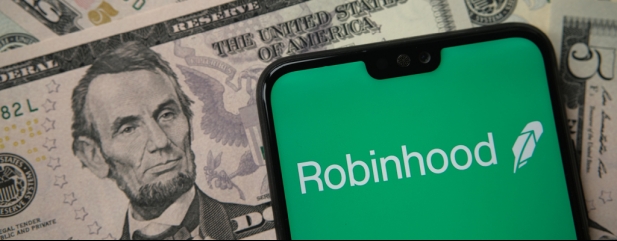Archived article
Please note that tax, investment, pension and ISA rules can change and the information and any views contained in this article may now be inaccurate.
Robinhood heads for the US stock market: key points to know

On 1 July US-based free stock trading app Robinhood released its prospectus ahead of a planned stock market listing on the US Nasdaq exchange, laying bare the underlying fundamentals of the business.
Robinhood was valued at $11.7 billion in last September’s funding round, and reports suggest it is targeting a $40 billion valuation as a listed company.
Even before the app was launched in 2015 it had attracted 700,000 customers via a waiting list. Customer numbers surged to 5.1 million in 2019, rising to 12.5 million in 2020 and then hitting 18 million customers as of the end of March 2021.
Robinhood is probably most famous for the role it played in the WallStreetBets Reddit social media forum battle against hedge funds where thousands of activist investors bought GameStop shares, forcing hedge funds to buy back their ‘short’ positions.
This has led to the so-called democratisation of investing with retail investors calling the shots in ‘meme stocks’ and posting sassy videos on social media.
Controversially the company doesn’t charge any commissions on client trades for the basic account. Instead Robinhood passes on orders to market makers such as Citadel Securities which aggregate them to secure a better price.
Robinhood gets paid for its order flow, raking in around $700 million in 2020, representing 75% of total revenues of $959 million. The percentage shot up to 81% in the three months to March 2021.
While other US brokers also sell customers’ order flow it generally makes up a much smaller proportion of revenues according to BrokerChooser.
Critics of the payments for order flow system say the arrangement incentivises Robinhood to find the highest price rather than best execution.
That’s one of the reasons why the practice has been banned in the UK and Canada and even the US regulator the SEC (Securities and Exchange Commission) is said to be taking a closer look and consulting on a change in the best execution rules.
In addition, Robinhood has come under scrutiny for the ‘gamification’ of investing, whereby it uses in-app prompts, rewards and bonuses to encourage frequent trading.
The company’s business model means it makes benefits financially from more frequent trading. And it seems to be working; in the first quarter of 2021 revenue per customer increased 65% year-on-year to $137.
It has drawn the attention of various US regulatory bodies and on 30 June the company was fined $70 million by the Financial Industry Regulatory Authority for causing ‘widespread and significant harm’ to customers over the past five years by giving them ‘false or misleading information’ and for ‘systematic supervisory failures’.
Important information:
These articles are provided by Shares magazine which is published by AJ Bell Media, a part of AJ Bell. Shares is not written by AJ Bell.
Shares is provided for your general information and use and is not a personal recommendation to invest. It is not intended to be relied upon by you in making or not making any investment decisions. The investments referred to in these articles will not be suitable for all investors. If in doubt please seek appropriate independent financial advice.
Investors acting on the information in these articles do so at their own risk and AJ Bell Media and its staff do not accept liability for losses suffered by investors as a result of their investment decisions.
Issue contents
Editor's View
Feature
- Why Tesla is a bad investment
- Why Tesla is a good investment
- Stiff competition stymies Liontrust ESG investment trust launch
- Stocks making highs and lows and how investors can use this information
- Tesla: Great investment or waste of time?
- Governments near agreement on global corporate tax ‘alignment’
- The winning and losing investments so far in 2021
 magazine
magazine








